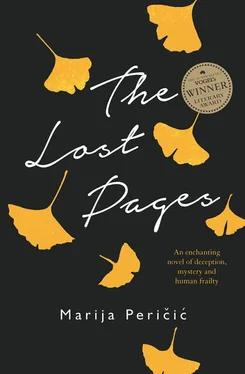At exactly the appointed time, a figure appeared at the door. I could make out a black hat through the glass panel, and my heart tightened for a moment, but when the door swung open Alexandr came in. He had certainly kept his word. He was scrubbed and shaven, wearing an elegant suit of light grey.
‘Here he is,’ I said.
Alexandr moved with grace and precision. Theodor’s face as he watched Alexandr thread his way through the tables was as beatific as if he were in the grip of religious ecstasy.
I introduced the two men. Alexandr played his part perfectly; I doubted whether one of the actors from the National Theatre could have pulled it off so well. In ten minutes he had charmed Theodor, and even I had almost forgotten that he was not the real Franz.
It had occurred to me that Theodor would ask Alexandr something about the stories, about which he would know nothing, and the deception would be revealed, so I sat ready to intervene at any moment. But I needn’t have worried. While we ordered the food and waited for it to come, Theodor kept the talk about general topics before he gradually steered the discussion around to his main objective: the terms of his contract with ‘Franz’. I could see that Theodor was uncomfortable discussing this with me sitting by, and before long I began to feel the same way. I was resentful, though not surprised, to find that the terms he was offering Franz were much more generous than those under which I laboured. I felt like a child whose father favoured his sibling over him. I had to keep reminding myself that the man sitting in front of me, who now had the pen in his hand and was signing the contract, was not Franz, and that I had in fact averted a crisis.
As soon as the contract was signed, Theodor slipped it into his briefcase and stood up to go, leaving most of his meal uneaten. No doubt he was afraid that the precious contract that had for so long eluded him would somehow be snatched from his grasp at the last moment.
‘I do apologise,’ he said. ‘Tomorrow morning I go to Vienna for a conference. I must bid you goodnight.’
He directed a small bow in Alexandr’s direction and then in mine.
‘Max, you are a good man,’ he said. ‘I am in your debt.’
I watched him walk out the door, then I sat back with a sigh. I knew that I had done the right thing.
IN THE FOLLOWING WEEKS I HEARD NOTHING FROM EITHER Theodor or Franz, and the problem of Franz appeared to have been solved. I was happy to be able to forget the whole thing, as I was more preoccupied than ever with Anja. Her university examination period was about to begin and, in much the same way that I had been neglecting my work on Schopenhauer, Anja had been neglecting her studies. I felt no guilt whatsoever about this; to me the neglect was solely a validation of the strength of her feelings for me.
I began helping her to prepare for her exams. She was particularly nervous about the oral examination, and in order to better assist her I had learned her subjects with such vigour that it was as though I were taking the exam myself. I set her difficult questions and interrogated her—once, I recall with shame, until she started to cry. I enjoyed my role of tutor. I enjoyed watching her strain to express herself concisely and synthesise ideas. She had a quick intelligence and I had no doubt that she would impress her examiners. Of course, at that time beautiful young female students were more of a rarity than they are now, and I felt that this would put her at no disadvantage with her professors.
I was walking back to my house from one of our many hours of study together, my head deep in the planning of the next lesson, when I heard my name being called. I looked up and there was Franz, the real Franz, standing in front of me in the street. At first I could not believe that it was really him. Seeing him gave me a morbid jolt, like seeing a man whom one had thought was dead. Indeed, the whole episode with Alexandr had almost convinced me that he was. But there he was, alive as ever. His nose sliced the air in front of him, underlining his presence, and the outline his body made against the street scene was as sharp as though he had been cut from a page and superimposed onto it.
Without preamble he proceeded to describe a new work that he had been writing. He told me that it was almost finished, and then he produced a sheaf of papers—his manuscript—which he handed to me as though we had agreed to meet by appointment for this purpose. He did not mention the many messages I had sent, and although I was bewildered by this, of course I did not probe him.
‘You’ll look over the manuscript,’ he said to me. It was more of an order than a request. Once again I was baffled as to why he would bother to press his writing on me when it was clear that he did not need my help.
I had automatically taken the manuscript, and the weight and thickness of the pages in my hand reminded me that my own writing had gone neglected and forgotten, the pages lying crumpled and senseless in the dark of desk drawers and briefcase pockets. The extra time that I had bought for myself had made me lazier rather than spurring me on. It was true that at odd times I had sat down at my writing table with my notes arranged before me, ready to work, but all it ever amounted to was me discovering anew that the material I had was depressingly impenetrable. After a short time I would give up and instead take out my journal and write about Anja.
But even the pages of my journal were strikingly blank for all the time I devoted to them. In truth, most of the minutes and hours when I should have been writing were spent sitting and staring out of the window in a reverie. Thinking about Anja induced in my body a feeling of floating warmth, which cocooned me from the passing minutes and hours. In a way, I preferred this time of remembrance and musing to the time I spent with her. When I was with her, her presence was too overwhelming, too beautiful for me to fully take in.
As I held the pages of Franz’s manuscript in my hand, the bile rose in me. How foolish I had been to think that the problem of Franz would simply fade away. I had never even considered the obvious fact that he would continue to write. For the first time I did not agree to look over his work as he had asked. Instead I told him about Anja, about how close we had become over the last weeks and months. I felt the unfamiliar thrill of sexual victory in the telling, something I rarely experienced; the thrill of having won a prize, of having beaten an opponent. Thrill, and a kind of pity. After all, what worth was some manuscript, even one that might prove a masterpiece, compared with the discovery of love?
I had expected Franz to be surprised by my revelation, even openly upset or bitter, but he just nodded and said that he had heard about it.
‘Congratulations.’ He said it with the most correct politeness and gave a crisp little bow. ‘Tell Anja that I wish her well for her exams.’
We parted, and for the remainder of my way home there was a heavy stone of uneasiness in my chest. I carried the papers in my hand, and they hissed at my side, rebuking me for my laziness. Of course the manuscript had upset me, but there was also the shock of seeing Franz again. Now it dawned on me that my deception of Theodor was brazen and irresponsible in the extreme. Surely the affair would come to light and then I would be completely ruined. It was only a matter of time. Franz’s parting words came back to me and I took them in for the first time. How could he know about Anja’s exams? I had not mentioned them to him. Had she been in contact with him? On the one hand it seemed unlikely. When would she have had the time to meet with him? During the day he was barricaded in his office, seeing no visitors, and in the evenings I had been with her. It was impossible that they could have met. But then how else could he have known?
Читать дальше












